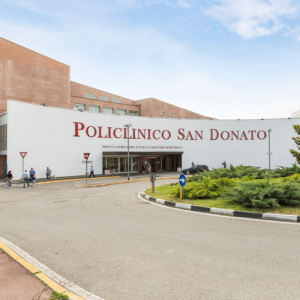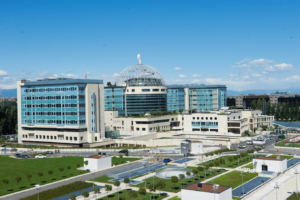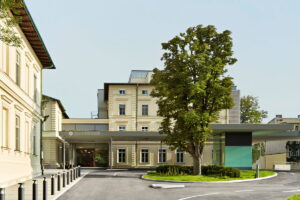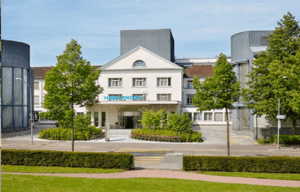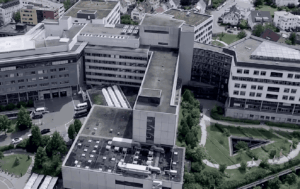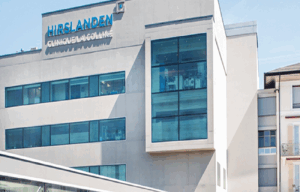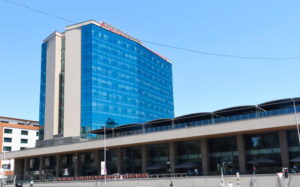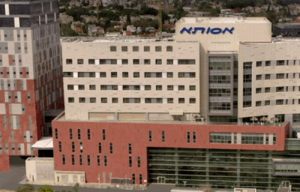Immunotherapy
Immunotherapy is an innovative pharmacological method of cancer treatment that uses the body’s own immune system to fight tumors. Unlike chemotherapy or radiation therapy, which directly attack cancer cells, immunotherapy enhances the body’s ability to recognize and destroy malignant cells on its own.
Immunotherapy has shown significant clinical results, particularly in patients with aggressive types of cancer:
- In the treatment of non-small cell lung cancer (NSCLC), immunotherapy increases patient survival rates by 20-30% compared to traditional therapies.
- In advanced-stage melanoma, immunotherapy helps achieve long-term remission in 40-60% of patients.
- In renal cell carcinoma, approximately 30% of patients show significant improvement and sustained disease control.
How does immunotherapy work?
Immunotherapy activates the immune system to initiate a targeted response against cancer cells. The body contains immune cells known as T-lymphocytes and B-lymphocytes, which are responsible for immune defense. T-cells circulate in the bloodstream, detect abnormal or cancerous cells, and work to destroy them.
On the surface of T-cells are specific protein receptors called immune checkpoints. Checkpoint inhibitors, a type of immunotherapeutic drug, help to unblock these checkpoints, allowing T-cells to aim a stronger attack on cancer cells.
How long does immunotherapy last and what is the treatment duration?
The duration of immunotherapy depends on the stage of the disease, the extent of cancer spread and the patient’s individual response to treatment. The effects of immunotherapy may not be immediate. The first follow-up assessment is typically conducted 2-3 months after the start of treatment.
Therapy is continued as long as the disease does not progress and severe adverse effects do not occur. If a complete and durable remission is achieved, discontinuation of treatment may be considered after approximately two years, based on medical evaluation.
How is immunotherapy treatment going?
Immunotherapy medicines are usually administered intravenously via IV infusion. Treatment can be delivered as monotherapy (using a single immunotherapeutic agent), or in combination with chemotherapy.
Top clinics
-
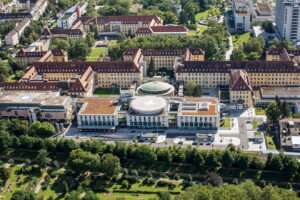 University Hospital Freiburg
University Hospital Freiburg -
 Acibadem Altunizade Clinic
Acibadem Altunizade Clinic -
 Medistate International Hospital
Medistate International Hospital -
 Ajibadem Atasehir Clinic
Ajibadem Atasehir Clinic -
 Medical Park Antalya Clinic
Medical Park Antalya Clinic -
 Dubai, UAE NMC Healthcare
Dubai, UAE NMC Healthcare -
 Shishli Memorial Clinic.
Shishli Memorial Clinic. -
 Milan, Italy San Donato Hospital in Milan, Italy
Milan, Italy San Donato Hospital in Milan, Italy -
 Milan, Italy San Raffaele University Hospital
Milan, Italy San Raffaele University Hospital -
 American Hospital Dubai
American Hospital Dubai -
 Burjeel Hospital Abu Dhabi
Burjeel Hospital Abu Dhabi -
 Debling Private Clinic
Debling Private Clinic -
 Rudolfinerhaus Private Clinic.
Rudolfinerhaus Private Clinic. -
 University Hospital Heidelberg
University Hospital Heidelberg -
 Vienna, Austria Wiener Privatklinik (WPK)
Vienna, Austria Wiener Privatklinik (WPK) -
 Munich, Germany University Hospital Munich (Ludwig-Maximilians-Universität)
Munich, Germany University Hospital Munich (Ludwig-Maximilians-Universität) -
 Asklepios Nord Heidberg
Asklepios Nord Heidberg -
 Charité Clinic
Charité Clinic -
 Gil Medical Center at Gachon University
Gil Medical Center at Gachon University -
 Clinique Montchoisy
Clinique Montchoisy -
 Clinique Genolier
Clinique Genolier -
 Acibadem Bodrum Hospital
Acibadem Bodrum Hospital -
 Zurich, Switzerland Bethanien Clinic
Zurich, Switzerland Bethanien Clinic -
 Barcelona, Spain QuironSalud Barcelona Hospital
Barcelona, Spain QuironSalud Barcelona Hospital -
 Barcelona, Spain Dexeus University Hospital
Barcelona, Spain Dexeus University Hospital -
 Barcelona, Spain Medical Center "Teknon"
Barcelona, Spain Medical Center "Teknon" -
 Barcelona, Spain University Hospital Barnaclinic+
Barcelona, Spain University Hospital Barnaclinic+ -
 Madrid, Spain University Clinic HM Madrid
Madrid, Spain University Clinic HM Madrid -
 Madrid, Spain University Hospital HM Monteprincipe
Madrid, Spain University Hospital HM Monteprincipe -
 Gebze, Turkey Anadolu Clinic
Gebze, Turkey Anadolu Clinic -
 Zurich, Switzerland Hirslanden Clinic
Zurich, Switzerland Hirslanden Clinic -
 Madrid, Spain Quiron Salud University Hospital
Madrid, Spain Quiron Salud University Hospital -
 Lugano, Switzerland Saint Anna Clinic
Lugano, Switzerland Saint Anna Clinic -
 Geneva, Switzerland Clinique des Grangettes
Geneva, Switzerland Clinique des Grangettes -
 Duesseldorf, Germany Oncological Center Dusseldorf
Duesseldorf, Germany Oncological Center Dusseldorf -
 Seoul, South Korea Samsung Medical Center
Seoul, South Korea Samsung Medical Center -
 Seoul, South Korea Medical Center at Ewha Womans University
Seoul, South Korea Medical Center at Ewha Womans University -
 SNUH
SNUH -
 г. Женева, Швейцария Клиника «Женераль-Болье»
г. Женева, Швейцария Клиника «Женераль-Болье» -
 г. Женева, Швейцария Hirslanden Clinique La Colline
г. Женева, Швейцария Hirslanden Clinique La Colline -
 г. Стамбул, Турция Клиника Флоренс Найтингейл
г. Стамбул, Турция Клиника Флоренс Найтингейл -
 г. Сеул, Южная Корея Медицинский центр «Асан»
г. Сеул, Южная Корея Медицинский центр «Асан» -
 г. Рамат-Ган, Израиль Клиника Шиба
г. Рамат-Ган, Израиль Клиника Шиба -
 г. Тель Авив, Израиль Медицинский центр “Ассута”
г. Тель Авив, Израиль Медицинский центр “Ассута” -
 г. Петах-Тиква, Израиль Медицинский центр имени Ицхака Рабина
г. Петах-Тиква, Израиль Медицинский центр имени Ицхака Рабина -
 г. Иерусалим, Израиль Медицинский центр “Хадасса”
г. Иерусалим, Израиль Медицинский центр “Хадасса”






